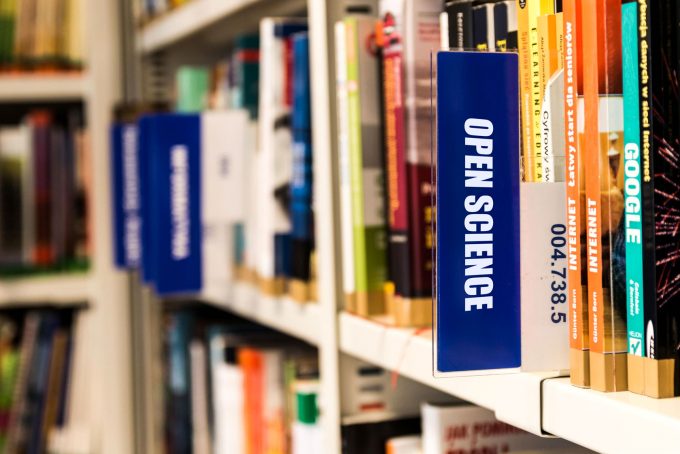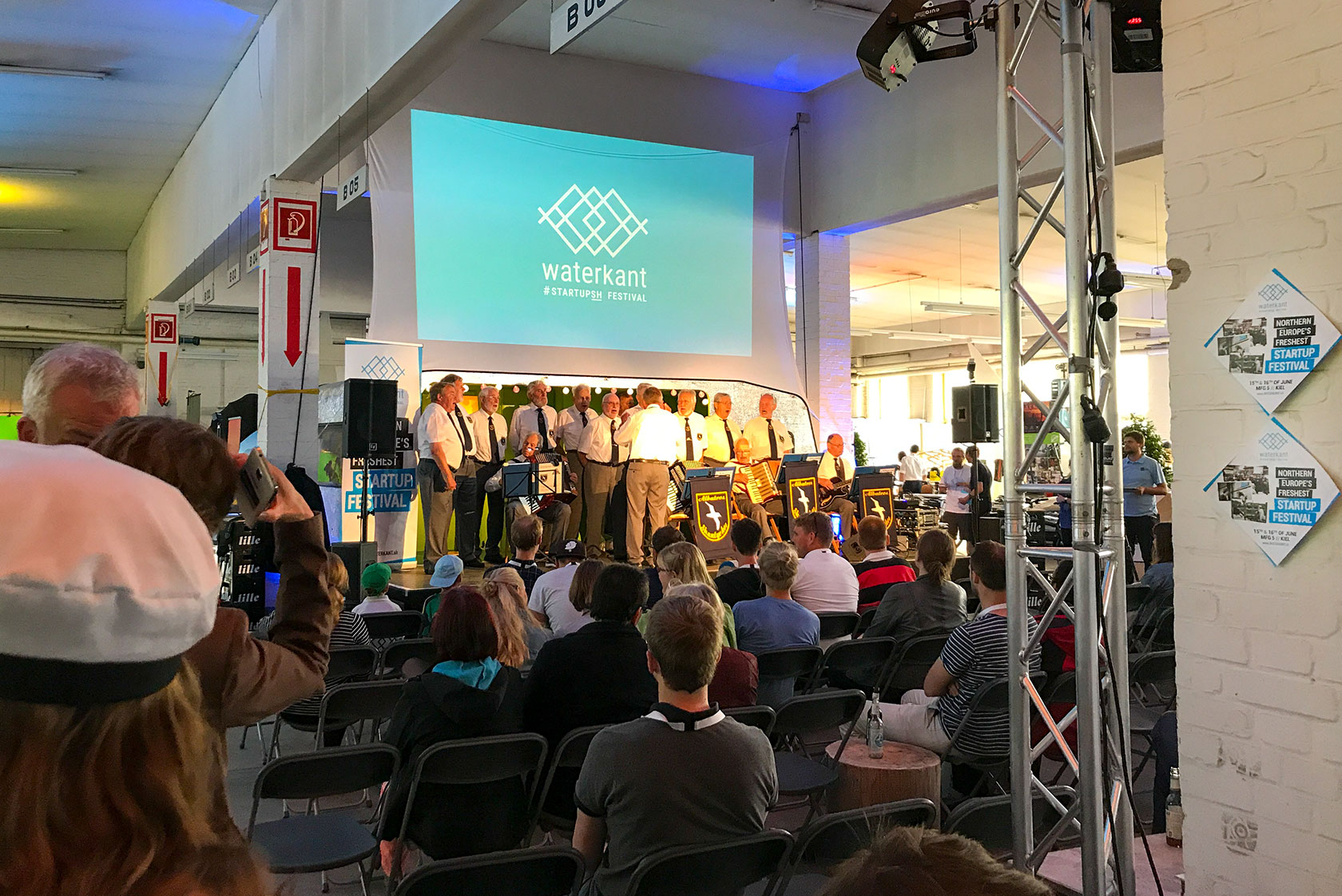
Waterkant Festival 2017: Augmented Reality, Educational Hacks and Coworking
The Waterkant StartupSH Festival 2017 in Kiel evolved around subjects like augmented and virtual reality, coworking, robots, "hack your education", science communication and a lot of other interesting trends and technologies. Our blogpost summarizes some highlights.
The Waterkant StartupSH Festival (#waterkant17) took place in 2017 for the second time. On June 15th and 16th members of the start-up scene from Schleswig-Holstein and other parts of Germany, but also international guests, especially from Scandinavian countries. But the festival organized by OpenCampus and StarterKitchen was as well frequented by people working in long-established organizations, politics and education.
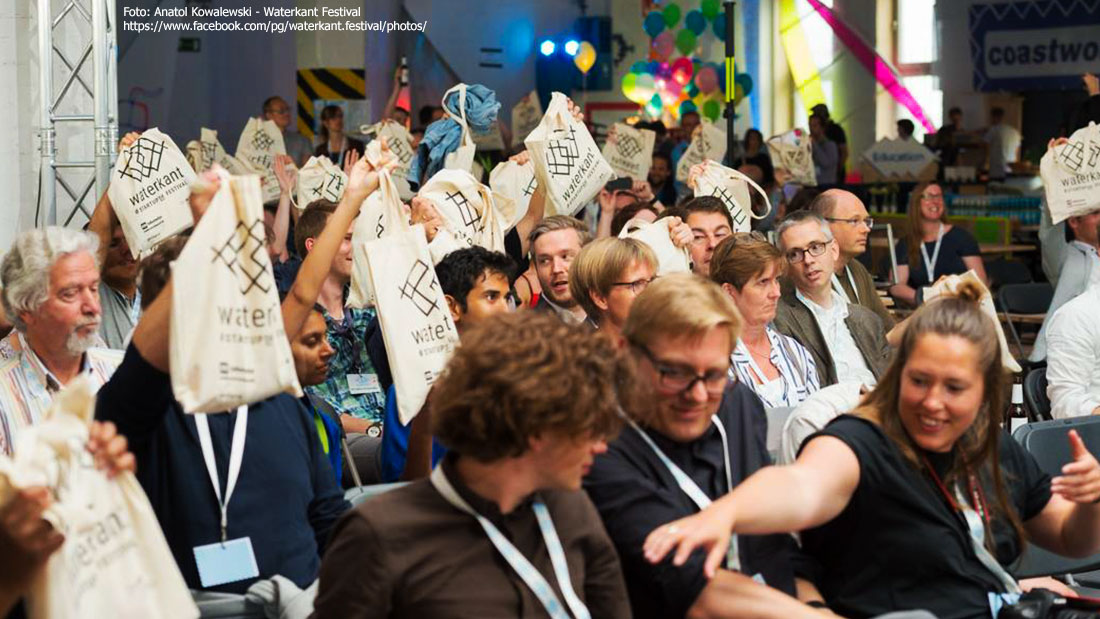
Shanty meets robot – tradition and new technologies are not necessarily opposites
The Waterkant schedule had a lot to offer: keynotes and presentations, interactive workshops and hands-on sessions in the exhibition area covered topics ranging from current trends to technologies like augmented reality, blockchain, chatbots and design thinking. Drones flying among the visitors, a robot waiting for orders and a lot of other participatory activities offered “technology to touch”. The robot joining the Shanty choir Albatros in singing its shantys demonstrated that tradition and technologies don’t have to form opposites.
Er singt mit dem Shantychor… @waterkant_sh #waterkant17 https://t.co/qEwj00FuA4 pic.twitter.com/ecIXikB6x4
— Birte Sindt (@AhoiNupsi) 15. Juni 2017
Bummelbude, supporting city centres with its online exhibition of regional shop windows, illustrated that conventional retail sale and digitalization just as little have to form opposites.
In his welcoming speech on Thursday evening Kiel’s lord mayor Ulf Kämpfer mentioned the first Digital „Kieler Woche“ (link in German) in September 2017, as counterpart of the traditional “Kieler Woche” currently taking place.
"Nicht nur für Nerds" sagt Ulf Kämpfer und eröffnet das @waterkant_sh Festival. #waterkant17 https://t.co/hlR2pB5PUx pic.twitter.com/TXd6Xpvdwv
— Birte Sindt (@AhoiNupsi) 15. Juni 2017
Start-up education in the countryside
Rural Coworking initiatives and funding opportunities were presented during the workshop “start-up in the countryside“, organized by Ulrich Bähr, Heinrich-Böll-Stiftung Schleswig-Holstein. Among them the project “Grüne Werkstatt Wendland“, which was introduced by Michael Seelig. The rural district Lüchow-Dannenberg, professorships of different universities as well as partners of the regional economy support this project. Design camps where students of the different universities participate and work in interdisciplinary groups on problems of local enterprises were part of the activities of the “Grüne Werkstatt”.
In the course of the workshop small groups discussed which requirements have to be fulfilled to let start-ups flourish in rural regions. The working group “education“ appeared like a logical continuation of the Leuchtfeuer 4.0 MOOC with results like:
- Customized further education, especially around subjects touching start-ups, as well as consulting services
- coworking in the countryside
- a (driverless) makerspace, resembling mobile libraries
- offering an “educational tour”, comprising a course plus a mobile makerspace
- online und on-site programs of adult education centres
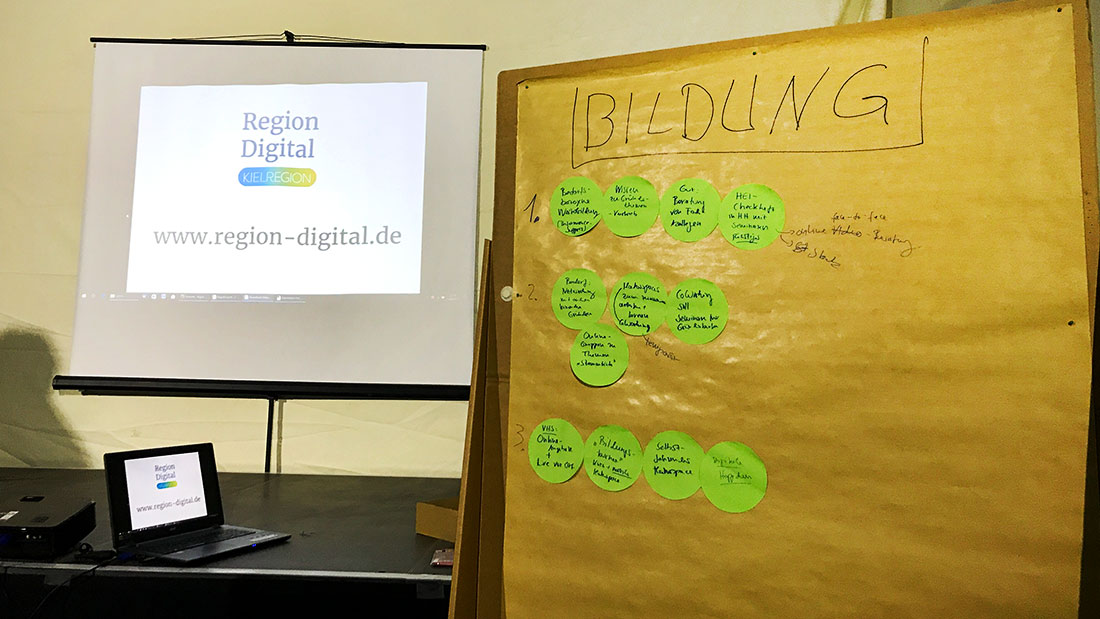
Inhaling the start-up spirit of Wacken Open Air
A famous brand from Schleswig-Holstein is the Wacken Open Air Festival. During his keynote Wacken Open Air co-founder Thomas Jensen described how the initially loss-making event was turned into a popular success, and what other companies might learn of their start-up thinking. The following quotations and their consistent customer focus reveal how important their attitude was for the success of Wacken:
- “The question was not, if we will carry on, but how will we carry on!”
- “Trust was the most important“, and not contracts
"#Trust was the most important" Thomas Jensen #Wacken Open Air founder #Waterkant17 #startupSH Festival in #Kiel #Collaboration #Leadership pic.twitter.com/W5F6DRfKyV
— BirgitInken Fingerle (@klarkreativ) 16. Juni 2017
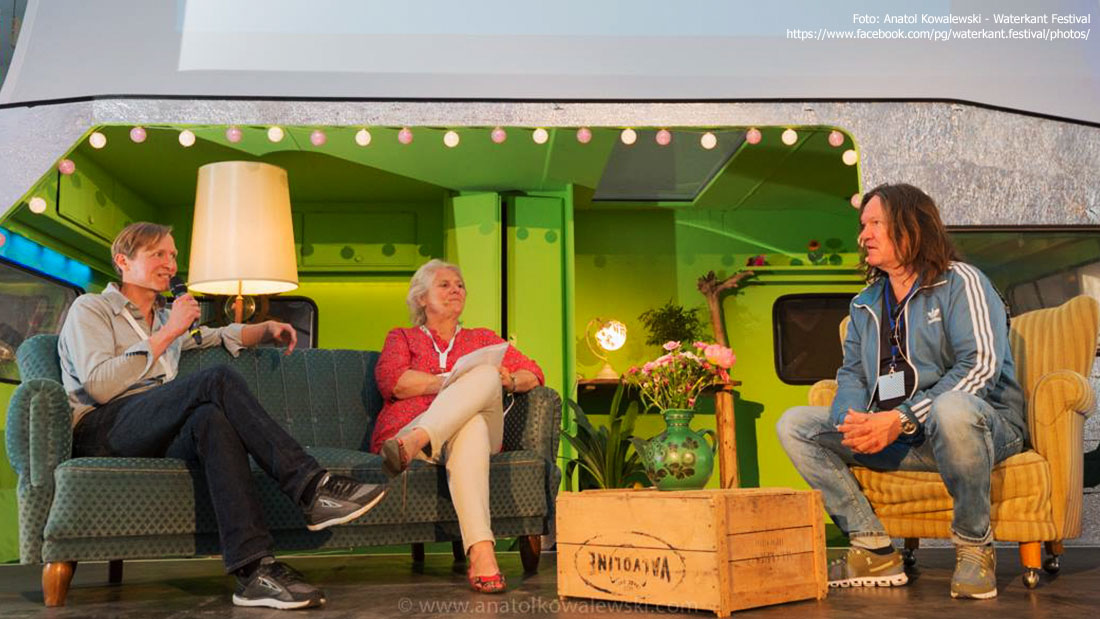
How to establish coworking spaces
Coworking was the subject of several sessions. Among them was the session “How do we want to work”, during which coworking expert Daniela Marzavan @danamarz presented the elements of coworking spaces, for example open space, private space, formal and informal meeting space, and reported her experiences with coworking projects in corporate groups. One of the difficulties she faced was the fact that key elements of New Work #newwork like spontaneity and coworking are unknown concepts in this part of the economy.
Afterwards Ingrid Wernecke presented Fleet 7 the coworking space of the Kieler Nachrichten, which will be inaugurated in short time. Establishing a coworking space constitutes one of the building blocks of the local newspapers’ ambitions to keep up with the digitalization.
“How to set up a coworking space?” was the question Christian Cordes, manager of the coworking space Schiller40 in Wolfsburg, and Tobias Schwarz, coworking manager St. Oberholz, answered in their session. They also addressed the different business models of coworking spaces and the necessity to perform different roles within a coworking space. In the case of a small coworking space, these roles like coworking manager, community manager, event manager und coffee manager often have to be performed by only one person. Nevertheless, not every person fits into the role of a coworking manager, because coworking spaces consist of very few pre-determined structures. Finally, Tobias Schwarz stated: “Librarians are very well educated when it comes to running an Open Space”
"#Librarians are very well educated when it comes to running an #OpenSpace" @Isarmatrose #waterkant17 #coworking
— BirgitInken Fingerle (@klarkreativ) 16. Juni 2017
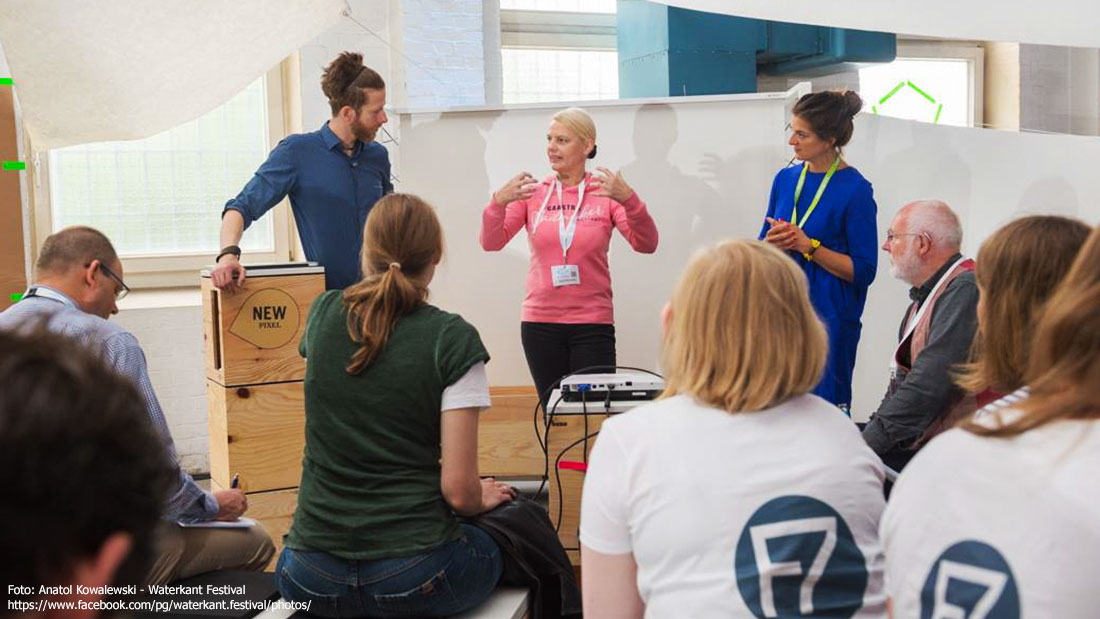
Hack your education
Nicole Driemeier of Goodwerk talked about opportunities for self-determined education in her “Hack your education” session.
Her recommendations:
- “Speak out what you want to learn, make a plan, redefine.“
- “Find the knowledge, content and network that helps you.”
- Her tool recommendations to collect learning content: Keeeb, Trello und Evernote.
- “Involve yourself, experience the topic”
- Network: Learn from the experts doing their things
At the same time, Nicole Driemeier stressed the dark side effects of learning and the importance of considering them during one’s own learning curve: “Expect it to be difficult (dealing with other people, who don’t share your learning journey) – but afterwards your learning curve goes up.”
Visual science communication
Visual science communication was the subject of Tom Duschers “Starting Up Visual Science Communication“ session, during which an innovative interactive poster visualizing earthquakes was presented.
@KonradRappaport presenting @thefutureocean #SciPoster @waterkant_sh festival #startupsh #waterkant17 #scicomm – great event and cool vibes! pic.twitter.com/SUlg945W61
— Tom Duscher (@TomDuscher) 16. Juni 2017
Augmented and virtual reality
Wondarplay offered to try an augmented reality solution at the Waterkant Festival, which displays stars and constellations in front of the real sky to support their recognition by means of a kind of cardboard and an Android app (an iOS-App is also planned).
At the Cap3 booth patterns printed on paper were brought to live on the mobile phone with an augmented reality app. Here, one could easily imagine interesting use cases for libraries and science communication.
Ein Stück Papier auf dem Tisch wird zum VR Erlebnis. @cap3.de auf dem @waterkant_sh #waterkant17 https://t.co/JE2emTshtW pic.twitter.com/zjFZ3PcsKx
— Birte Sindt (@AhoiNupsi) 16. Juni 2017
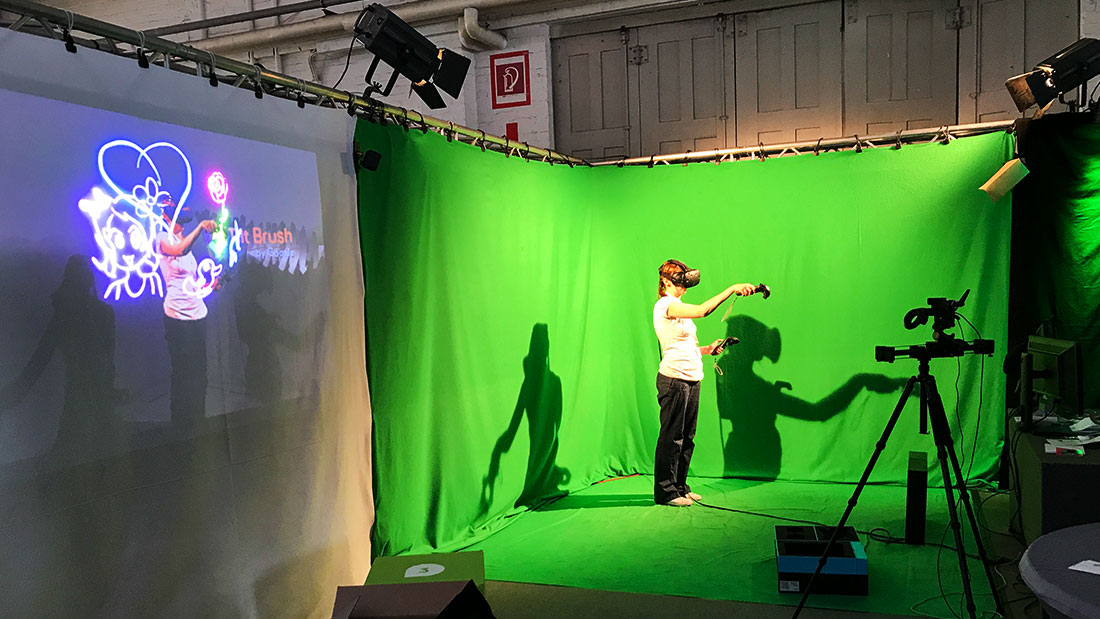
Real activity was encouraged by “Studio Creality“ offer of virtual reality painting. The company is currently working on mixed reality livestreams on the Twitch platform. At the Waterkant Festival they enabled everybody to enjoy their creativity and test the tool “Tilt Brush”, wearing headset and a wrist control module. After feeling lost in the beginning, one quickly learns to handle the control modules and can enjoy the new kind of “painting the air“. This demo video offers some insights on the virtual colour palette, the paintbrushes and the effects, which the tool “Tilt Brush“ includes.
Können diese Augen lügen? #Kindchenschema – So cute #robot #Waterkant17 #startupSH in #Kiel pic.twitter.com/Mo0xsf3jUK
— BirgitInken Fingerle (@klarkreativ) 16. Juni 2017
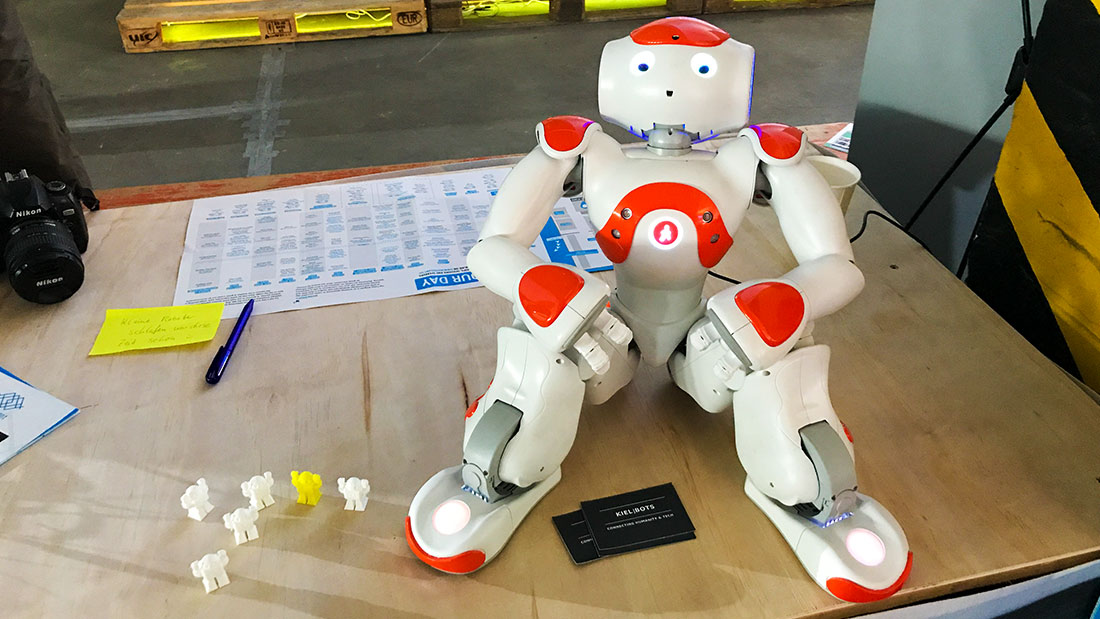
Useful robots
Robots were subject of one of the keynotes: Marius Aabel from the Norwegian No Isolation talked about their experiences building a telepresence robot for the support of children with long-term illnesses: “How we developed a production ready telepresence in 10 months“
In another interesting session in the robotics area of the Waterkant Festivals Hannes Eilers reported on the development of the robot “Emma“: “The acceptance of technology or technological products increases enormously, if one integrates people with a non-technological background in time.“ The robot designated to be applied in care services is supposed to execute time-consuming, simple tasks later, in order to improve care quality and support caregivers at their documentation obligations, thereby giving them more time for human interaction. Human interaction with robots is generally encouraged, if the robots resemble a nice puppy-dog that reacts easily and directly. Especially older people react more to sounds, facial expressions and gestures. If someone pats “Emma’s“ head, she giggles for example. On a touchpad attached to her belly one can chose what Emma is supposed to do, for instance perform magic, mimic animals, sing songs like “An der Nordseeküste“ or dance “Gangnam Style“.
Den vermisst doch keiner, wenn ich ihn mitnehme oder? @waterkant_sh #waterkant17 https://t.co/OrtVH9qbqC pic.twitter.com/bf2uMuLIAR
— Birte Sindt (@AhoiNupsi) 16. Juni 2017
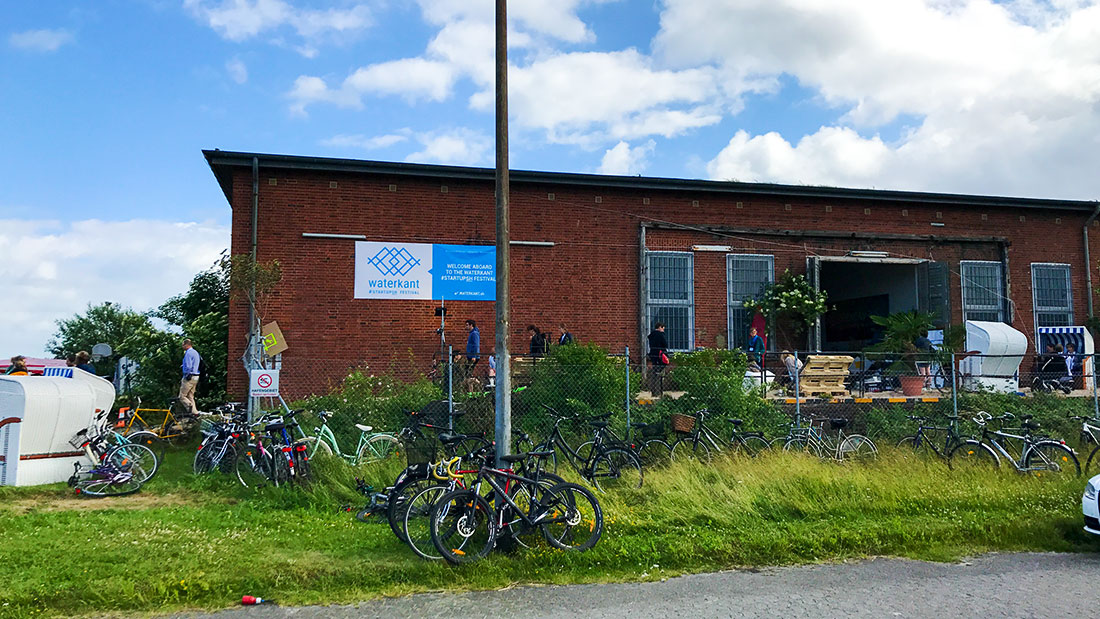
A worthwhile event at the Waterkant – we are looking forward to 2018
The Waterkant-Festival 2017 was a very interesting event on current technologies, trends and founding topics – and, much beyond start-ups, for people from other companies and organizations. The nice location situated at the Kiel fjord and the social programme complemented the experience. As the programme was so comprehensive, it was not possible to see and hear everything, or even to sum up everything in one single blogpost.
Additional information:
- Kieler Nachrichten; Waterkant-Festival 17: Start-ups lernen von den Großen (link in German)
- Slides of the session “Machine Learning“ by Christian Wiele
- Tweets zum Waterkant-Festival: #waterkant17
- Instagram: #waterkant17
View Comments
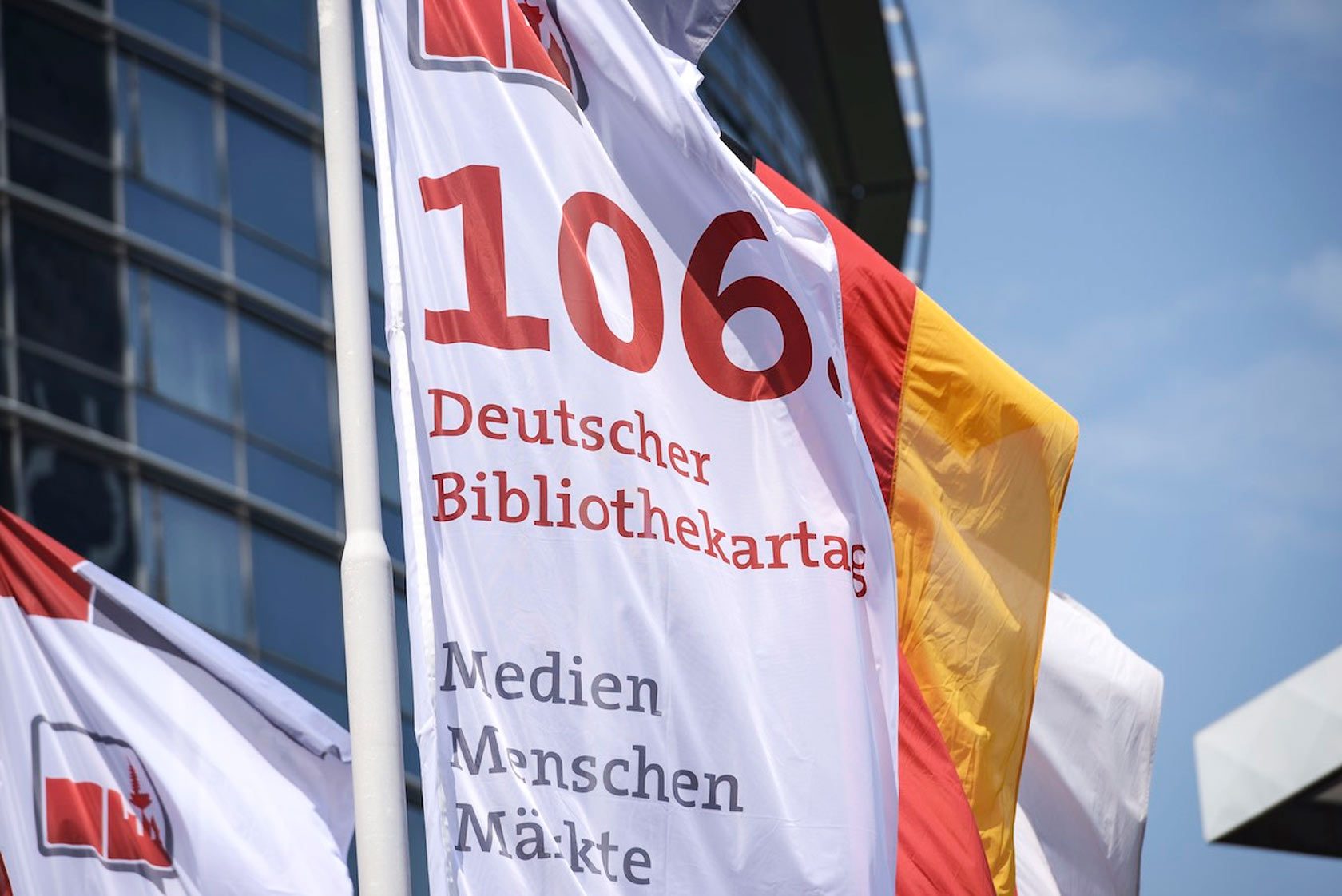
Open Access at German Librarians´ Day 2017: From the Big DEAL to the Everyday Workplace
A variety of sessions and lectures at Librarians´ Day 2017 (Bibliothekartag 2017)...

